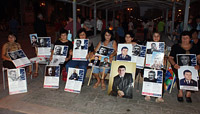Yesterday in Paris the PACE session took place, during which the report of the PACE rapporteur Thomas Hammarberg’s on 1609 and 1620 resolutions was presented. The report implies that there are political prisoners in Armenia and that Armenia didn’t abide with the requirements of the mentioned resolutions. Among other recommendations the PACE commission offers to deprive Armenia of the voting right in the PACE during its January winter session. This fact was confirmed by Armen Rustamyan, member of the PACE delegation. Hammarberg didn’t personally present the report but it implied certain rigid statements. To the question whether the report was very rigid for Armenia Rustamyan said, “Yes.” On November 22 when Hammarberg was in Yerevan he said that he would have to be quite critical to Armenia because no progress was registered in terms of fulfillment of the PACE resolution requirements. The recommendations made during today’s meeting of the PACE monitoring committee are unfavorable for Armenia, Minister of Foreign Affairs of Armenia Edward Nalbandyan said during a press-conference yesterday. He pointed out that it was part of working process. 15 of 80 delegations were present at the meeting. Ten of them voted for the adoption of such recommendations but the final decision will be made during the PACE winter session in Jan 2009. The co-rapporteurs of the committee John Prescott and Georges Colombier will visit Armenia before the session. Nalbandyan hopes that till Jan 2009 the situation will change. Armenia has implemented most of PACE’s requirements, particularly, resolutions 1609 and 1620. Nalbandyan said that the Armenian authorities would continue the reforms – not because somebody had told them to but because the reforms met the interests of the Armenian people. Of course, Armenia respects the decisions of the international organizations it is member to and respects the commitments it undertook when entering them. "I think that we are meeting these commitments and will continue to meet them in the future," Nalbandyan said. The Minister did not specify what the recommendations were about and left the room right after finishing his statement. Declaring it “unacceptable” that persons could be charged and deprived of their liberty for political motivation in Armenia in relation to the events of 1 and 2 March 2008, the Monitoring Committee of the Parliamentary Assembly of the Council of Europe (PACE) yesterday recommended suspending the voting rights of Armenia’s eight-member delegation to the Assembly until the authorities “have clearly demonstrated their political will to resolve this issue.” The co-rapporteurs would visit the country in January 2009, with a view to reporting back to the Committee on the first day of the January 2009 part-session on any progress with respect to the release of these persons. In two earlier resolutions, the Assembly had made several demands following the post-electoral violence of March 2008, including the holding of an independent, transparent and credible inquiry into what happened, and the release of persons detained on “seemingly artificial and politically motivated charges” in connection with those events. In its draft resolution, adopted yesterday in Paris, the Monitoring Committee welcomed the Armenian President’s creation of a fact-finding group of experts to look into the March events as an important step towards meeting the Assembly’s demands, but cautioned that its credibility would depend on how it conducts its work. They also expressed satisfaction at efforts to initiate reforms in the media, electoral legislation and the judiciary. However, the parliamentarians said that “notwithstanding positive developments in some areas” the limited progress with regard to the release of the above mentioned persons meant the Armenian delegation should be deprived of its vote, if no further progress is reached in this request before the January 2009 PACE plenary session. The Assembly is due to decide on the matter on Thursday 29 January during its forthcoming winter plenary Session (26 – 30 January 2009). “During the session the main accent was put on releasing political prisoners. The fact of not releasing them was considered as a politically motivated decision. The impression was that if Armenia manages to do so within a month it may not be deprived of its voting right,” said Rustamyan. “They made some proposals not favorable for Armenia,” Nalbandian told journalists, commenting on the results of the Paris meeting. He did not specify those proposals, saying only that the Armenian government can still prevent their approval by the PACE. “I must say that that is an ongoing process,” said Nalbandyan. “The issue will be put to the Parliament Assembly vote in January. Before that the committee’s rapporteurs, Messrs. Prescott and Colombier will visit Armenia. Perhaps there will be developments in January that will allow for a revision of that proposal.” The Armenian government was quick to react to the committee’s decision, with Foreign Minister Eduard Nalbandyan describing it as “not favorable” for the country at a late-night news briefing Wednesday. Nalbandyan said the government hopes to avert Council of Europe sanctions during upcoming negotiations with the Monitoring Committee’s two Armenia rapporteurs, John Prescott and Georges Colombier. The latter are due to visit Yerevan ahead of the next PACE session scheduled for late January. “Perhaps there will be developments in January that will allow for a revision of that proposal,” said Nalbandyan. The minister might have hinted at a possible general amnesty for the jailed oppositionists, an option advocated by Council of Europe officials. The Monitoring Committee deplored the Armenian authorities’ failure so far to declare such an amnesty.

